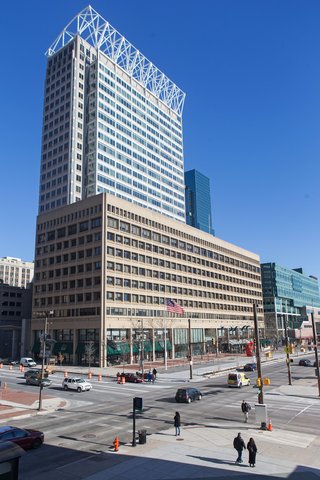Listen to this article 2 min
See Correction/Clarification at the end of this article.
The assessed value of the landmark office tower at 100 E. Pratt St. has dropped by nearly $77.8 million, potentially meaning a loss of millions of dollars in commercial tax revenue as its anchor tenant T. Rowe Price Group Inc. prepares to move to a new headquarters in Harbor Point.
The lower assessment at 100 E. Pratt St. of $93.65 million was awarded after an appeal this year by the tower's owner, a roughly 45% drop in value compared to the $171.4 million that the property was originally assessed at, according to Maryland State Department of Assessments and Taxation spokeswoman Meghann Malone.
The state's new assessment means the city's commercial tax revenue will take a hit totaling millions in the coming year and beyond as tax bills start to go out from City Hall in the new fiscal year. Malone said that the appeal filings were not public, so it is not immediately clear what argument the owners made to persuade the state to change the assessment.
Officials of property owner 100 Pratt Street Ventures LLC, were unavailable to comment on Monday.
The tower is facing a massive exodus next year with the loss of its large anchor T. Rowe Group to a new global headquarters less than a mile away at Harbor Point. The financial giant today occupies about 450,000 square feet of office space in the 614,000-square-foot building at 100 Pratt St.
The successful appeal by owners 100 Pratt Street Ventures LLC comes at a time when the value of other large office properties in the central business district are also posting dramatic devaluations.
Two other towers in the district, located at One South Street and 1 E. Pratt Street, respectively, changed hands at bargain prices that showed a combined loss of $86.1 million over the prices the towers sold for over the past eight years.
The struggles in Baltimore's commercial real estate market mirror what is going on in other mid-size to large markets across the U.S. as corporate downsizing and hybrid work schedules impact leasing post-pandemic. Officials and stakeholders are aggressively trying to reinvent downtown areas with residential conversions and other revitalization strategies.
Baltimore's high 21% office vacancy rate downtown, coupled with an overloaded subleasing market with millions of square feet in available space, has hampered the central business district for several years.
Michael L. Higgs, director of the State Department of Assessments and Taxation, is concerned that other property owners will follow suit and file assessment appeals as well, leading to a potential domino effect that continually diminishes the central business district's tax base and puts further strain on the commercial market.
"I see a wave coming," Higgs told the Baltimore Business Journal, last week.
Mayor Brandon Scott was unavailable for comment Monday on the potential loss of city commercial real estate tax revenue.
Correction/Clarification
An earlier version of this story incorrectly reported a combined loss of $76 million in the value of two towers, One South Street and 1 E. Pratt Street, over the past eight years. The combined loss is actually $86.1 million.
